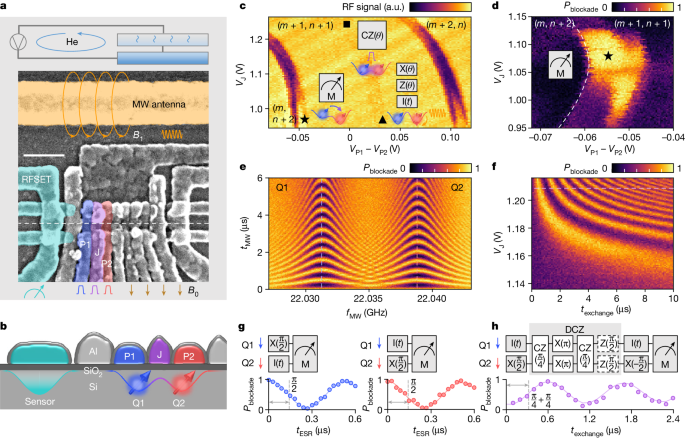Achieving High-Fidelity Spin Qubit Operation Above 1 K
Core Concepts
Achieving high-fidelity spin qubit operation above 1 K is crucial for scalable and fault-tolerant quantum computation.
Abstract
Introduction
- Encoding qubits in semiconductor spin carriers for commercial quantum computers.
- Need for fault-tolerant operation above 1 K due to thermal load at millikelvin temperatures.
Experimental Setup
- Operating spin qubits in silicon above 1 K with required fidelities.
- Algorithmic initialization protocol for pure two-qubit state preparation.
- Incorporation of radiofrequency readout for high fidelities in readout and initialization.
Results
- Single-qubit Clifford gate fidelities up to 99.85%.
- Two-qubit gate fidelity of 98.92% achieved.
- Overcoming the limitation of thermal energy needing to be well below qubit energies for high-fidelity operation.
Customize Summary
Rewrite with AI
Generate Citations
Translate Source
To Another Language
Generate MindMap
from source content
Visit Source
www.nature.com
High-fidelity spin qubit operation and algorithmic initialization above 1 K - Nature
Stats
Fidelities in the range required for fault-tolerant operations at temperatures above 1 K.
Radiofrequency readout achieving fidelities up to 99.34% for both readout and initialization.
Single-qubit Clifford gate fidelities up to 99.85%.
Two-qubit gate fidelity of 98.92%.
Quotes
"These advances overcome the fundamental limitation that the thermal energy must be well below the qubit energies for the high-fidelity operation to be possible."
Key Insights Distilled From
by Jonathan Y. ... at www.nature.com 03-27-2024
https://www.nature.com/articles/s41586-024-07160-2
Deeper Inquiries
How can the findings of operating spin qubits above 1 K impact the future of quantum computing
The findings of operating spin qubits above 1 K can significantly impact the future of quantum computing by addressing a critical challenge in scaling up quantum systems. By demonstrating high-fidelity operation at higher temperatures, this research opens up the possibility of building quantum computers that can operate in environments where cryogenic cooling is not as stringent. This advancement paves the way for more practical and cost-effective quantum computing solutions that can be deployed at scale. Additionally, the ability to achieve fault-tolerant operations at elevated temperatures expands the potential applications of quantum computing beyond specialized research facilities, making it more accessible for widespread use in various industries.
What potential challenges could arise in implementing this high-fidelity operation in practical quantum computing systems
Implementing high-fidelity operation in practical quantum computing systems based on spin qubits above 1 K may encounter several challenges. One potential challenge is maintaining the coherence and fidelity of qubits in the presence of increased thermal energy. Higher temperatures can introduce more noise and errors in the quantum system, requiring advanced error correction techniques and robust control mechanisms to mitigate these effects. Additionally, ensuring the scalability of the system while operating at elevated temperatures poses a technical challenge in terms of managing the thermal load and maintaining qubit stability across a large number of qubits. Addressing these challenges will be crucial for realizing the full potential of high-fidelity quantum computing at higher temperatures.
How might the ability to achieve fault-tolerant quantum computation at higher temperatures influence other areas of scientific research
The ability to achieve fault-tolerant quantum computation at higher temperatures can have a profound impact on other areas of scientific research beyond quantum computing. For instance, the development of robust quantum algorithms and error correction protocols that can operate at elevated temperatures could benefit fields such as materials science, drug discovery, and optimization problems. By enabling more accessible and reliable quantum computing capabilities, advancements in fault-tolerant quantum computation at higher temperatures can accelerate breakthroughs in complex problem-solving, simulation, and data analysis across various scientific disciplines. This could lead to transformative advancements in research areas that rely on computational power beyond classical limits.
0
